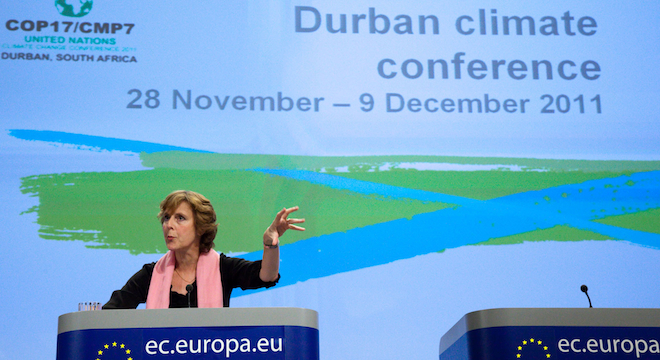EMILY GERTZ
Two weeks of international climate treaty talks kick off on Monday in Durban, South Africa. The location for the conference, an annual two-week confab, is a nod to this developing nation’s increasingly robust economic and political influence.
The big question going into this year’s U.N. climate summit is whether or not international negotiators will, finally, formally create a successor to 2007’s Kyoto Protocol, which expires in 2012.
The Kyoto Protocol sets legally-binding greenhouse gas (GHG) reduction targets on the world’s richest industrialized nations, excluding the U.S., that is.
The Clinton administration never brought the Kyoto Protocol to the Senate, in order to avoid expenditure of domestic political capital on a treaty that it believed the Senate would never ratify (as well as a helping of global embarrassment).
But as the world’s wealthiest, most powerful, and single-largest GHG polluter has been a heavy presence in climate talks all the same — and heavy expectations.
At a press conference in Brussels, Belgium on November 24, EU Commissioner for Climate Action Connie Hedegaard berated the U.S. for its failure to take a significant leadership role so far in the international climate agreements.
“The EU is ready for a global treaty in Durban,” Hedegaard said in prepared remarks. “But the reality is that other economies like the US and China are not. Let’s be clear: The EU supports the Kyoto Protocol. But a second Kyoto period with only the EU, representing 11% of global emissions, is clearly not enough for the climate. This cannot constitute success in Durban. The key question is: when will others follow? Today’s mutually interdependent world means global climate action from all.
No “Son of Kyoto” agreement came out of 2009’s much-hyped, ultimately disappointing, Copenhagen talks. But the “Copenhagen Accord,” the weak, non-binding GHG reduction agreement that did, had a significant feature: the world’s major developing economics of Brazil, Russia, India, and China (the “BRIC” nations), which are not bound to GHG reduction targets under Kyoto, signed on in proposing accountability to other developing nations for their climate pollution.
Also at Copenhagen, a “Green Climate Fund” was proposed, to be funded by richer nations to to finance low- or non-carbon technology transfer to the world’s poorer “Least Developed Countries,” as well as adaptation to the impacts of climate change.
Hopes were more modest going into 2010’s Cancun, Mexico session. Afterwards, some parties to the negotiations came away encouraged, lauding the “bottom-up” process at Cancun that gave smaller and poorer nations more of a voice in setting up the foundations of a future Kyoto successor.
According to experts at the non-profit World Resources Institute, formalizing these foundations, including the Green Climate Fund, will be central at the Durban talks. Open questions at Durban will include how the fund will be structured and managed, according to Clifford Polycarp, a senior associate on WRI’s International Financial Flows & Environment Project.
At a media briefing last week, he told reporters that while the richer nations are supposed to have all $100 billion into the pot by 2020, they haven’t yet made public promises about how they’ll do it. Developing nations, meanwhile, have not committed to any accountability on how they use the money.
Durban also will build off progress at Cancun toward getting all nations to join the richest in committing to binding greenhouse gas reduction targets, said Jennifer Morgan, director of WRI’s climate and energy program. (China has released a detailed document document outlining its reduction accomplishments and the positions it will bring to Durban, reported The New York Times.)
One contentious issue to solve here involves whether and how nations will agree to measurement, reporting, and verification of their promised pollution cuts.
The proposed amount and pacing of carbon pollution cuts being discussed still fall short of what scientists say must be done to forestall the worst impacts of human-propelled climate change, said Morgan, and it’s not clear that anyone will succeed in upping the ante.









